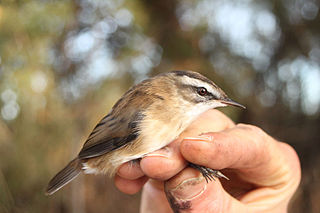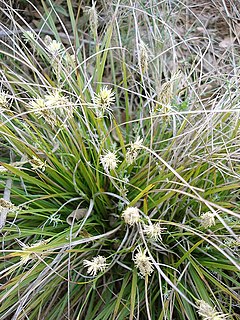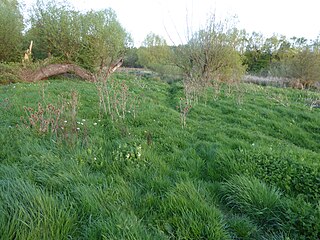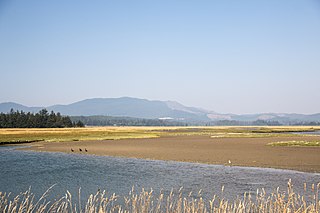
The Cyperaceae are a family of graminoid (grass-like), monocotyledonous flowering plants known as sedges. The family is large, with some 5,500 known species described in about 90 genera, the largest being the "true sedges" genus Carex with over 2,000 species.

The sedge warbler is an Old World warbler in the genus Acrocephalus. It is a medium-sized warbler with a brown, streaked back and wings and a distinct pale supercilium. Sedge warblers are migratory, crossing the Sahara to get from their European and Asian breeding grounds to spend winter in Africa. The male's song is composed of random chattering phrases and can include mimicry of other species. The sedge warbler is mostly insectivorous.

The moustached warbler is an Old World warbler in the genus Acrocephalus. It breeds in southern Europe and southern temperate Asia with a few breeding in north-west Africa. It is partially migratory. South-west European birds are resident, south-east European birds winter in the Mediterranean breeding range, and the Asiatic race migrates to Arabia, India and Pakistan.

The sedge wren is a small and secretive passerine bird in the family Troglodytidae. It is widely distributed in North America. It is often found in wet grasslands and meadows where it nests in the tall grasses and sedges and feeds on insects. The sedge wren was formerly considered as conspecific with the non-migratory grass wren of central and South America.

Cyperus is a large genus of about 700 species of sedges, distributed throughout all continents in both tropical and temperate regions.

Ornamental grasses are grasses grown as ornamental plants. Ornamental grasses are popular in many colder hardiness zones for their resilience to cold temperatures and aesthetic value throughout fall and winter seasons.

In botany, a glume is a bract below a spikelet in the inflorescence of grasses (Poaceae) or the flowers of sedges (Cyperaceae). There are two other types of bracts in the spikelets of grasses: the lemma and palea.

Rhynchospora is a genus of about 400 species of sedges with a cosmopolitan distribution. The genus includes both annual and perennial species, mostly with erect 3-sided stems and 3-ranked leaves. The achenes bear a beak-like tubercule and are sometimes subtended by bristles. Many of the species are similar in vegetative appearance, and mature fruits are needed to make a positive identification.

Carex is a vast genus of more than 2,000 species of grass-like plants in the family Cyperaceae, commonly known as sedges. Other members of the family Cyperaceae are also called sedges, however those of genus Carex may be called true sedges, and it is the most species-rich genus in the family. The study of Carex is known as caricology.

Liversedge F.C. is a football club based in Cleckheaton, England, on the border with Hightown in Liversedge. They are currently members of the Northern Premier League Premier Division.

Lambert's Castle is an Iron Age hillfort in the county of Dorset in southwest England. Since 1981 it has been designated as a Site of Special Scientific Interest (SSSI) on account of its geology, archaeology and ecology. The hillfort is designated a scheduled monument together with a bowl barrow, the sites of a post-medieval fair and a telegraph station. The site was on the Heritage at Risk Register but was removed in 2022 as a result of the Hillforts and Habitats Project.

Gahnia is a genus of sedges native to China, Southeast Asia, New Guinea, Australia, New Zealand and a number of Pacific Islands. The common name is due to the toothed margins. It often forms tussocks.
Nascia is a genus of moths of the family Crambidae.
Newton Ketton Meadow is a Site of Special Scientific Interest in the Darlington district of Durham, England. It is situated alongside a small tributary of the River Skerne, about 2 km south-west of the village of Great Stainton and 3 km east of the village of Brafferton.

Southfield Farm Marsh is an 8.6-hectare (21-acre) biological Site of Special Scientific Interest in Kettering in Northamptonshire. An area of 2.8 hectares is managed as a nature reserve by the Wildlife Trust for Bedfordshire, Cambridgeshire and Northamptonshire.
Ron Ward's Meadow With Tadley Pastures is a site of Site of Special Scientific Interest (SSSI). It is based on the edge of Tadley in Hampshire, England. It is managed by the Hampshire and Isle of Wight Wildlife Trust.

Sitka Sedge State Natural Area is an estuary and beach on the north coast of the U.S. state of Oregon in Tillamook County. Sitka Sedge consists of 357 acres (144 ha) of tidal marsh, mudflats, dunes, forested wetlands, and uplands at the south end of the Sand Lake estuary, north of Tierra Del Mar.
Alfredo Sampaio Filho, known as Alfredinho, was a Brazilian retired football manager and player. He played as a right winger.
This page is based on this
Wikipedia article Text is available under the
CC BY-SA 4.0 license; additional terms may apply.
Images, videos and audio are available under their respective licenses.














